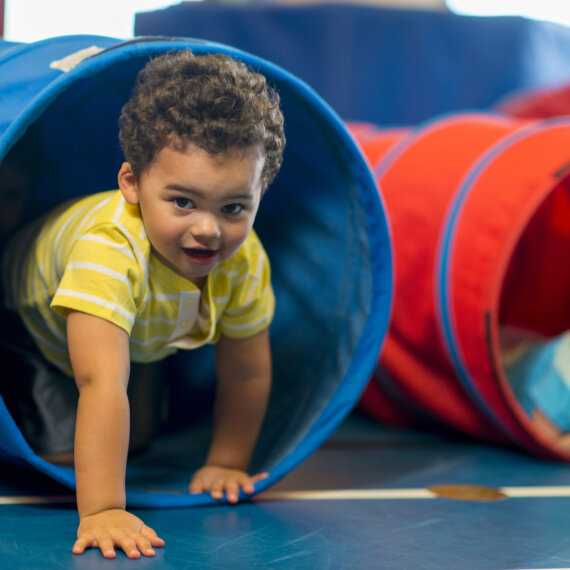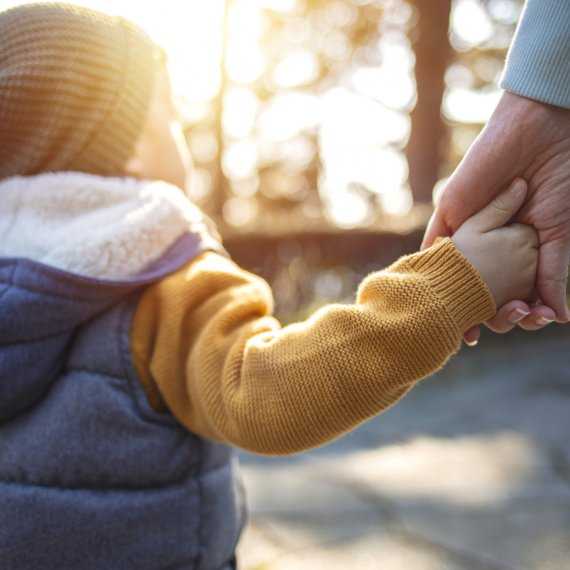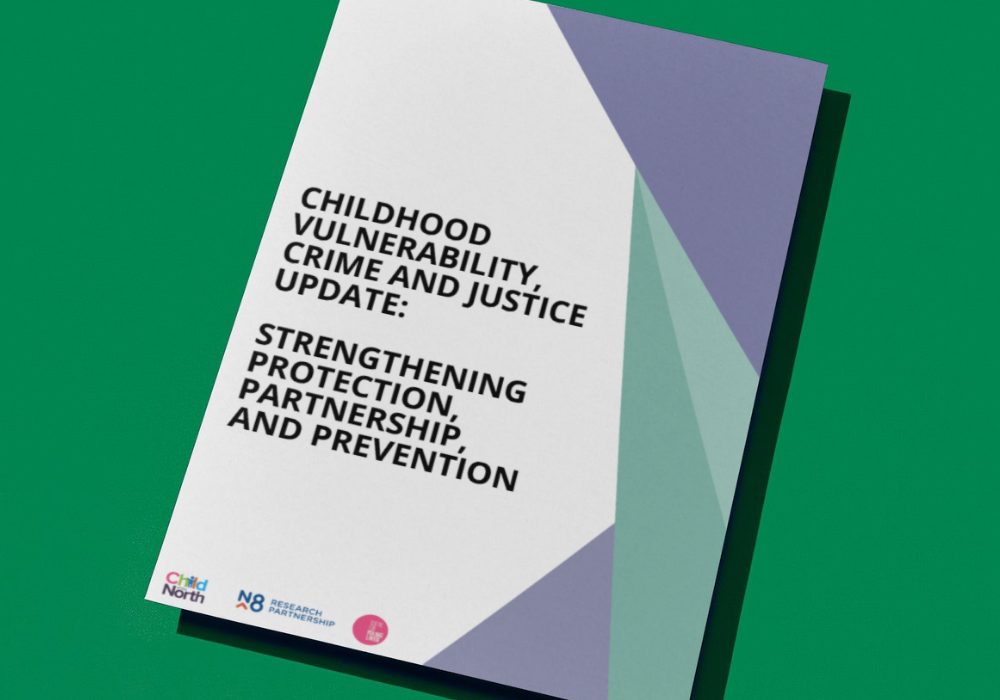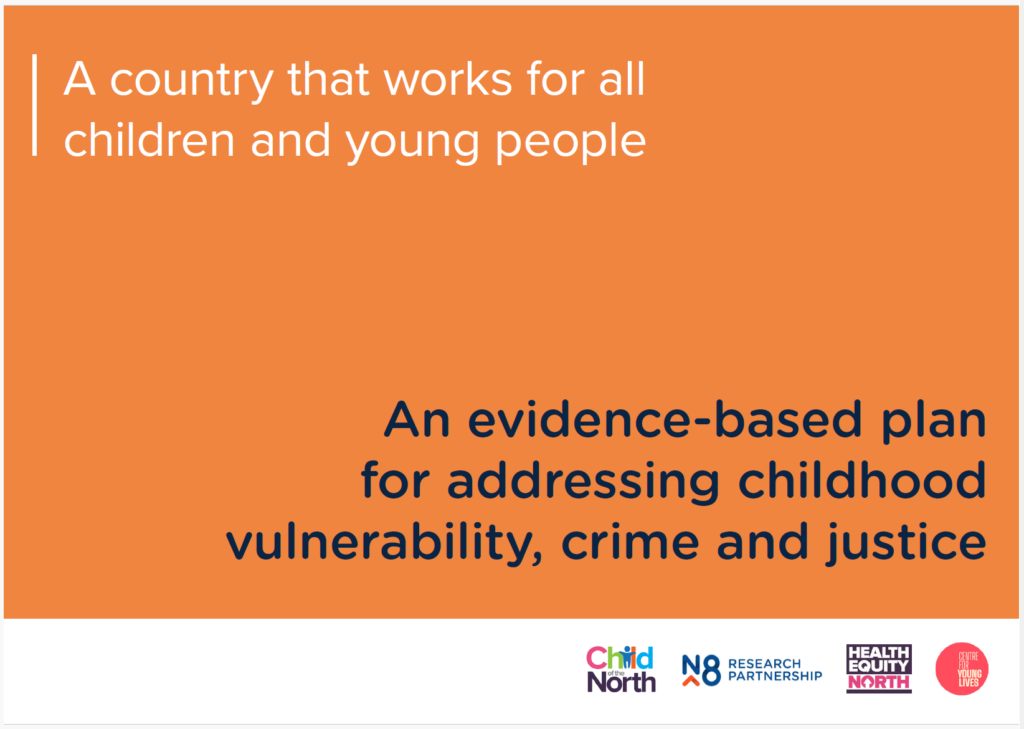Addressing childhood vulnerability, crime and justice
For a country that works for all children and young people.
We are calling on the government to put children first. Our 2024 report series provides evidence-based plans and recommendations on how to improve outcomes for children and young people in the North of England and beyond. Published alongside 2025 report updates, new practitioner toolkits have been designed to support schools, child health services, and local authorities to implement the report recommendations and put children first. #ChildrenFirst
In 2024, Child of the North and Centre for Young Lives initiated a major campaign calling on the government to build a country that works for all children and young people. This campaign delivered a series of reports and webinars on twelve key topics identified by Northern child health leaders as major issues of concern, including poverty, special educational needs, school attendance and mental health. These reports provide rigorous research and pragmatic, evidence-based recommendations.
First published in November 2024, the eleventh report An evidence-based plan for addressing childhood vulnerability, crime and justice, sets out an evidence-based plan to protect and support the thousands of vulnerable children in England at risk of involvement with the criminal justice system. It recommends targeted action to divert vulnerable young people away from criminal exploitation and harm by focusing on keeping children in school, rolling out mental health hubs in areas of disadvantage, and delivering better identification and support.
Written by researchers from the ESRC Vulnerability & Policing Futures Research Centre, the report shows how every year, thousands of children become involved in the criminal justice system or become victims of serious violence or crime. While increasingly fewer young people are going into secure custody, most children involved in the criminal justice system share similar experiences of childhood adversity, including poverty, unmet SEND, exclusion from school, abuse, neglect and exposure to domestic violence, addiction, or mental ill-health at home.
An update, Childhood vulnerability, crime and justice update: Strengthening protection, partnership and prevention, released in November 2025, forms part of the #ChildrenFirst campaign, drawing attention back to the issues highlighted in the series, and providing a series of toolkits designed to support schools, child health services and local authorities to implement the report recommendations and improve outcomes for all children.
We need the government, policymakers, practitioners, academics, communities and young people to work together to build a country that works for all children and young people.
How To Guides
A series of toolkits have been developed to help practitioners and organisations take practical steps to improve the health and wellbeing of the children and young people with whom they work directly. Building on the findings of the Child of the North reports, these ‘How To’ guides provide evidence and suggestions about how all parties can work together.
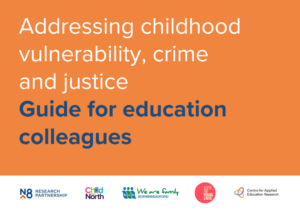 |
Published November 2025
Addressing childhood vulnerability, crime and justice – Guide for education colleagues |
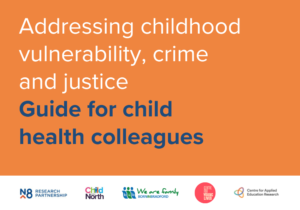 |
Published November 2025
Addressing childhood vulnerability, crime and justice – Guide for child health colleagues |
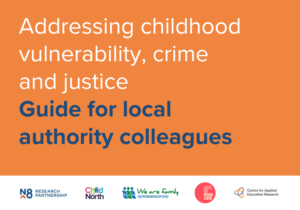 |
Published November 2025
Addressing childhood vulnerability, crime and justice- Guide for local authority colleagues |
Webinar
In December 2024 a number of the report’s authors came together to discuss the report’s findings and policy recommendations, including:
- Adam Crawford (Universities of York & Leeds)
- Kate Brown (University of York)
- Georgina Watkinson (West Yorkshire Police)
- Anna Barker (University of Leeds)
- Sarah Lindsay (The Boathouse Youth Charity)
Anne Longfield, Executive Chair of the Centre for Young Lives, said:
“Our prisons are full, and our streets feel unsafe. Hardly a week passes without seeing the horrific consequences of failing to tackle serious violence and exploitation. Teenagers are losing their lives or their liberty, families are left devastated and communities left in shock.
“Frequently, there is a chilling sense of inevitability for many of the most vulnerable children, particularly those with unsupported Special Educational Needs and those in care or on the edge of it. They are at greater risk of being groomed into criminal or sexual exploitation or caught up in gangs and serious violence.
“Supporting these children and their families early, through schools, youth work, and mental health support, is crucial. We need a whole-child and whole-system approach to tackle childhood vulnerability, with children and families at the centre of coordinated services.
“The new Government is already making clear that its approach to tackling serious violence and exploitation will include intervention and diversion programmes to support vulnerable teenagers, including its forthcoming Young Futures pilots.
“This provides a vital opportunity to start to rebuild and refresh the community-based, targeted interventions that we know can divert young people away from harm, boosting life chances, and saving lives. The recommendations set out in this report should be at the heart of that programme.”
Professor Mark Mon Williams, Child of The North report series editor, said:
“Preventing children from entering the criminal justice system is not just a moral imperative but essential for a prosperous country. We would empty our prisons if we invested in early interventions that address the root causes of vulnerability. The evidence shows we can break intergenerational cycles of disadvantage by prioritising education, mental health, and community support.
“Breaking the links between a disadvantaged childhood and the criminal justice system would create a brighter future for all children and the whole of our society.”
Dr Camilla Kingdon, Former President of the Royal College of Paediatrics and Child Health, said:
“As a paediatrician, it is easy to feel hopeless when you look at the figures for the number of children entering the criminal justice system. It is heart sinking to know that we can often predict which children will end up getting into trouble and yet historically the system has felt paralysed to act early. This report gives me hope. We can break the seemingly endless cycle of intergenerational disadvantage. Here we have a set of recommendations using a holistic child centred approach, underpinned by the use of data, that can reset the trajectory to one that is brighter and more optimistic.”
Co-author of the report, Professor Kate Brown, Co-Director of the ESRC Vulnerability & Policing Futures Research Centre, said:
“The evidence is definitive – we urgently need stronger social and community support for the most vulnerable children and young people. Failure to act will mean we keep on punishing the most vulnerable in the criminal justice system and leaving them exposed to crime.
“If we are serious about preventing crime, it’s investment in children’s life opportunities, care and education that matters most.”
Co-author of the report, Professor Adam Crawford, Co-Director of the ESRC Vulnerability & Policing Futures Research Centre, said:
“There is both an urgent need and ripe opportunity to shift the dial on how we advance a ‘whole system’ approach to childhood vulnerability, crime and justice that places children’s needs at the heart of service provision.
“Reducing exposure to harm up-stream and minimising young people’s engagement with criminal justice through diversion are key to preventing children becoming victims of crime, reducing offending and improving outcomes, not only in childhood but across the life-course.”
Sign up for updates on our 2024/25 Campaign
We will only use this data for the purposes of providing updates on the Child of the North 2024/25 campaign and report series. For more information see the Privacy Policy at https://www.sheffield.ac.uk/privacy
Previous Reports
Previous reports can be found archived on our Child of the North Reports page.
Contact Us
Stephen Parkinson, Research Partnership Manager
***
***
